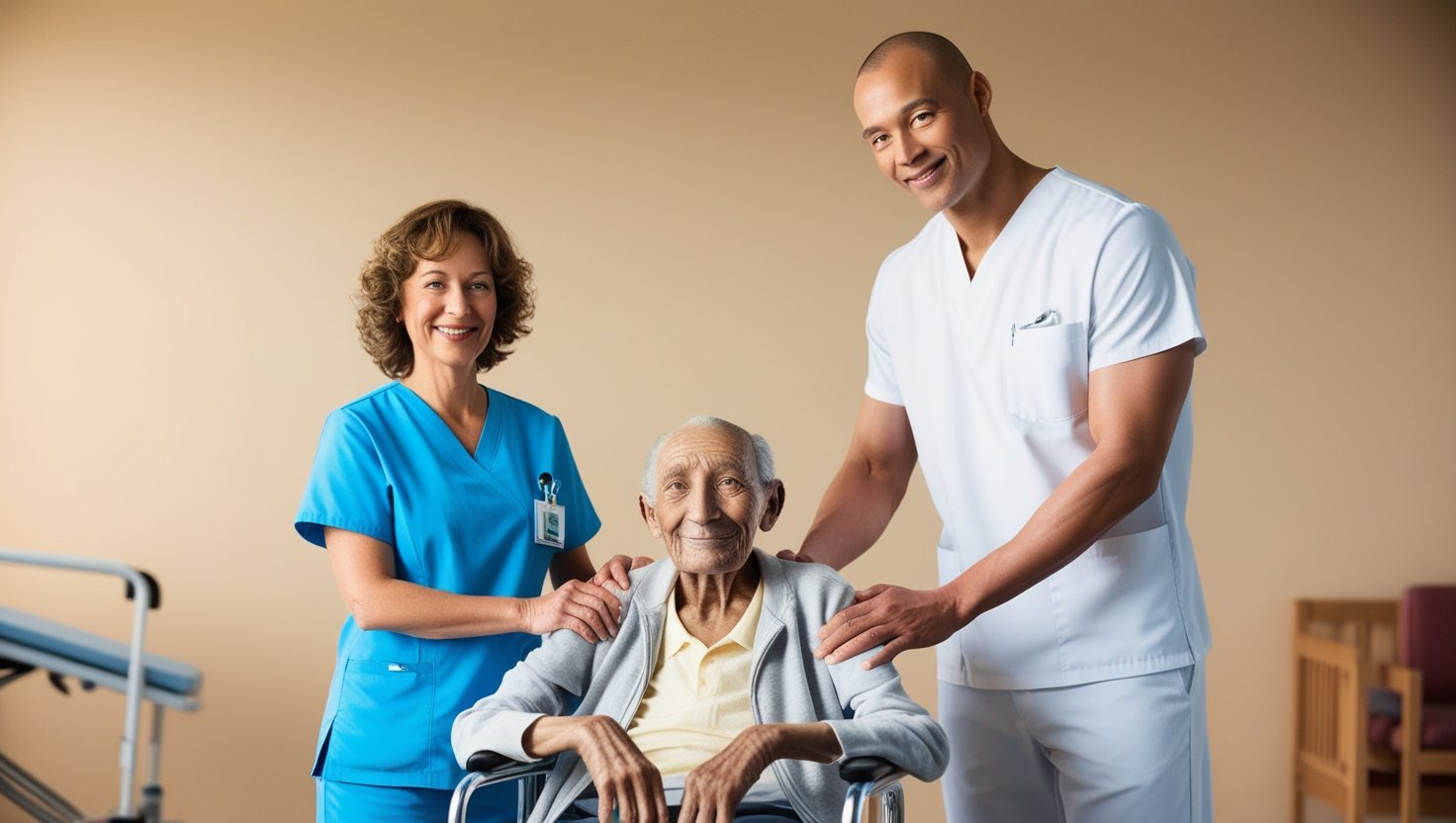Finding the right caregiver for your senior loved one can feel like searching for a needle in a haystack. The stakes are high, and the challenges are real: from checking caregiver qualifications to their compatibility with your family member’s needs and personality. It’s easy to feel overwhelmed especially when the well-being of someone you love hangs in the balance. But let’s flip the script on that narrative—this process is not just about filling a position; it’s about finding the right caregiver for that.
The importance of selecting the right caregiver cannot be overstated. A skilled and compassionate caregiver can transform the daily lives of seniors. Quality elder care goes beyond just meeting physical needs; it’s about creating an environment where seniors can thrive emotionally and socially. As families, you hold the power to make informed decisions that will impact your loved ones’ lives profoundly. This guide will provide you with essential insights and practical strategies on how to find the best caregivers for seniors, ensuring that your loved ones receive the personalized care they deserve. Let’s dive into the journey of discovering a caregiver who aligns with your family’s vision for quality aging—because every senior deserves to live boldly, not just exist.
Understanding Caregiver Qualifications

When figuring out how to find the best caregivers for seniors, understanding their qualifications is key. First, look for certifications that show a caregiver’s training in elder care. Certifications like Certified Nursing Assistant (CNA) or Home Health Aide (HHA) are good starting points. These credentials show the caregiver has formal training and is committed to quality care. Specialized training in areas like dementia care or first aid is also valuable, especially if your loved one has specific health needs.
Experience is important in senior care. A caregiver with hands-on experience knows the nuances of working with older adults, from handling mobility issues to spotting signs of distress. For example, someone who has worked in assisted living facilities for years likely has developed crucial communication and patience skills. When interviewing candidates, ask about their past experiences and how they’ve handled different situations to get a sense of their capability and adaptability.
Specialized skills for specific health conditions can greatly impact the quality of care your loved one receives. If your senior has conditions like Parkinson’s or diabetes, find caregivers with training or experience in managing these. This not only ensures proper support but also provides peace of mind for family members. Matching a caregiver’s skills with your senior’s needs leads to better outcomes and a more satisfying caregiving relationship.
Thorough background checks are essential. Checking references and employment history confirms a caregiver’s qualifications and reliability. This step helps you feel more confident in your decision, ensuring your loved one gets the best care. Remember, finding the right caregiver isn’t just about qualifications—it’s about creating a supportive environment where seniors can thrive.
Assessing Compatibility
Finding a caregiver who fits well with your senior loved one is just as crucial as checking their qualifications. A successful caregiver-senior relationship goes beyond skills and certifications; it hinges on personality compatibility. During the caregiver interview process, don’t hesitate to ask questions that reveal their approach to care and communication. For example, inquire about how they handle stressful situations or what strategies they use to engage seniors who might be resistant to assistance. This dialogue can shed light on whether their style aligns with your loved one’s needs.
Shared interests can also play a significant role in nurturing a strong bond between caregiver and senior. If your parent loves gardening, look for someone who enjoys spending time outdoors or has experience in horticulture. This common ground not only makes daily interactions more enjoyable but can also motivate seniors to participate in activities that enhance their well-being. Engaging in shared hobbies can foster a sense of companionship, making the caregiver feel less like a hired hand and more like a friend.
Communication styles are another essential factor to consider. Some seniors may prefer direct and straightforward conversations, while others might thrive in a more gentle and patient environment. Pay attention to how the caregiver interacts during the interview: Are they attentive and responsive? Do they listen actively to both you and your loved one? Establishing open lines of communication from the outset will set the tone for a positive relationship. Remember, effective communication is a two-way street, and finding someone who can adapt their style to suit your senior’s needs will lead to better outcomes in their in-home care options.
At SeniorThrive, we understand that every senior is unique, and their care should reflect that individuality. Taking the time to assess compatibility can lead to more meaningful interactions and ultimately improve your loved one’s quality of life. If you’re feeling uncertain about how to navigate this process, don’t hesitate to reach out for guidance.
Conducting Background Checks

Finding the right caregiver for your loved one is a crucial step in ensuring their well-being and comfort. One of the most important aspects of this process is conducting thorough background checks on potential caregivers. Start by gathering basic information, such as their full name, date of birth, and Social Security number. This information will help you access the necessary records to verify their qualifications and history. Many elderly care services recommend using a combination of online resources and professional background check services to get a comprehensive view of a caregiver’s background.
When reviewing a criminal history report, pay close attention to any convictions that may raise red flags, particularly those related to violence or theft. A clean record is essential, but remember that not every infraction disqualifies someone from providing care. For instance, a minor traffic violation may not be significant in the context of elder care. However, if there are serious offenses, it’s vital to weigh these against the specific needs of your senior loved one. This diligence helps ensure that you are selecting a caregiver who can provide support without compromising safety.
Checking references and previous employment is equally important in the background check process. Speak directly with former employers or clients to understand the caregiver’s work ethic and reliability. Ask questions like, “How did they handle challenging situations?” or “Can you provide an example of their interactions with clients?” These insights can reveal a lot about how the caregiver might relate to your senior. Additionally, caregiver support resources, such as local agencies or community organizations, often have valuable information on caregivers they have vetted themselves, adding another layer of assurance.
Finally, keep in mind that background checks are just one part of a larger picture when it comes to finding the best caregivers for seniors. Once you’ve completed these checks, combine this information with your assessments of compatibility and communication styles. By taking these thorough steps, you’re not only protecting your loved one but also empowering them to live their life fully and independently with the right support in place.
Evaluating Caregiver Availability and Flexibility
Finding the right caregiver for your senior loved one means understanding their schedule and specific care needs. Each person has unique requirements, from medication management to companionship during daily activities. For example, if your senior enjoys a morning routine with a walk or reading the newspaper over breakfast, you’ll want to ensure the caregiver’s availability matches these preferences. Mapping out a typical day can help clarify what support is needed and when, ensuring your loved one gets the care they deserve.
Flexibility in caregiving is crucial. Life is unpredictable, especially as we age, and circumstances can change quickly—whether it’s a sudden health issue or a shift in routine. An adaptable caregiver can make a big difference in maintaining your senior’s comfort. For instance, a caregiver who can adjust their hours for a sudden doctor’s appointment or adapt their approach based on how your loved one feels creates a more supportive environment. When interviewing caregivers, ask about their experiences with adapting to changes. Their answers can reveal their flexibility and problem-solving skills.
Discussing potential availability issues upfront is essential. For example, if a caregiver has commitments like another job or personal responsibilities, it’s better to address these concerns early. This transparency sets clear expectations and helps prevent misunderstandings later. If you’re working with an agency, ask about their policies on backup caregivers and how they handle scheduling conflicts. These discussions ensure consistent and reliable care for your loved one.
Including these considerations in your caregiver search will enhance the quality of care your senior receives and empower you to make informed decisions. Finding a caregiver or agency that prioritizes availability and flexibility is key to a positive caregiving experience. With the right support, seniors can thrive at home while maintaining their independence and dignity.
Involving Seniors in the Selection Process
When searching for the best caregivers for seniors, it’s crucial to involve them in the selection process. Letting them express their preferences and needs can lead to a better caregiver-senior relationship. Start by having open conversations about the qualities they value in a caregiver. For example, if they enjoy gardening, they might prefer someone who shares that interest. Encouraging them to articulate their desires validates their feelings and helps create an environment where they feel respected.
Facilitating these discussions can be simple. Set aside time for a relaxed chat over coffee or during a favorite activity. This lets your loved one share their thoughts without pressure. You could ask, “What qualities do you think are important in someone who will help you?” or “Are there any specific activities you’d like to do with your caregiver?” This approach opens the door for dialogue and reveals valuable insights about their care preferences. Listening actively and taking notes shows that their input matters and that you’re committed to finding the right caregiver.
Including seniors in decision-making isn’t just about finding the right fit; it significantly impacts their well-being. When seniors have a say in their care, they often feel more satisfied and in control of their lives. For instance, a senior involved in selecting their caregiver may be more inclined to engage in daily activities and maintain a positive outlook. This sense of empowerment fosters independence, which is vital for aging individuals who might otherwise feel sidelined.
Involving seniors in the caregiver selection process enriches their experience and strengthens family bonds. It shows that you recognize their agency and are committed to providing personalized support tailored to their needs. This collaborative approach enhances the quality of care and honors the dignity of your loved ones.
Trial Periods and Ongoing Assessment
When you’re looking for the right caregiver for your loved one, trial periods can be a game changer. These phases let both the caregiver and the senior get used to each other’s routines and personalities. It’s not just about checking if the caregiver can handle tasks like bathing or cooking. It’s also about seeing how well they connect personally. For example, if both enjoy gardening, their shared interest could make daily interactions more enjoyable.
Setting up a system for regular feedback during this trial is crucial. Regular check-ins help ensure that both the caregiver and the senior feel comfortable sharing their thoughts. This could be as simple as a weekly chat where family members ask open-ended questions. Maybe the caregiver mentions the senior struggles with mobility in the mornings. This could lead to adjusting the schedule or care techniques. The goal is to create a space where everyone feels heard and valued.
Over time, it’s important to see how well the caregiver meets the changing needs of your senior. Health or mood changes might require updates to the care plan, so staying flexible is key. For instance, if memory issues arise, more structured routines or caregivers with dementia training might be needed. By staying proactive and adjusting based on feedback, families can ensure their loved ones get the best care.
Trial periods and ongoing assessments improve care quality and strengthen bonds between seniors and caregivers. This approach keeps families involved in the care journey, ensuring everyone thrives in the partnership.
Resources for Finding Caregivers
Finding the right caregiver for your loved one can feel like searching for a needle in a haystack. However, there are numerous resources available to help ease that process. Local elder care agencies are often a great starting point; they specialize in connecting families with qualified caregivers. These agencies typically conduct thorough background checks and provide training. This ensures that the caregivers they recommend have the proper qualifications and experience. Community organizations, such as senior centers or local nonprofits, can also be valuable resources. They often have networks of caregivers and may even offer support groups where families can share experiences and recommendations.
In today’s digital age, technology has transformed how families can find caregivers. Numerous websites and apps are designed specifically to connect families with potential caregivers. Additionally, don’t overlook informal resources within your community. Friends, neighbors, or even local healthcare providers can often recommend trusted caregivers they’ve encountered. Word of mouth can be incredibly powerful when searching for someone to provide care. Engaging with your community can yield insights that online searches might not capture. Keep in mind that every family’s situation is unique, so consider using a combination of these resources to create a comprehensive approach to finding the best caregivers for seniors.
In summary, when exploring how to find the best caregivers for seniors, utilize a mix of local and online resources. This includes elder care agencies, community organizations, and technology. By casting a wide net and being proactive in your search, you can ensure that you find a caregiver who not only meets the qualifications but also resonates well with your loved one.
Taking the Next Steps Towards Quality Care
In conclusion, finding the best caregivers for your seniors is an essential journey that requires thoughtful consideration and proactive efforts. By understanding caregiver qualifications, you empower yourself to make informed choices. Remember that trial periods and ongoing assessments are crucial in ensuring that the caregiver meets the evolving needs of your loved one. Utilizing local resources, elder care agencies, and technology can help streamline this process, making it less overwhelming.
Quality caregiving has a profound impact on the well-being of seniors, enhancing their quality of life and allowing them to thrive in their golden years. It’s not just about managing aging; it’s about embracing it as a beautiful evolution. So take these insights to heart and step forward confidently in your search. If you feel uncertain or need support, don’t hesitate to reach out for help—Contact Us to learn more. Together, let’s rewrite the narrative around aging and ensure that every senior enjoys the care they deserve. Remember, at SeniorThrive, we believe that aging is an opportunity to live fully and vibrantly.



